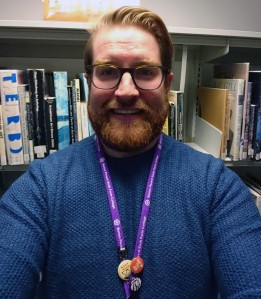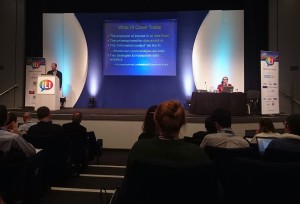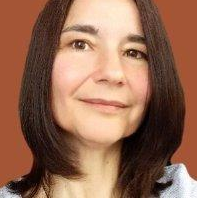ILI 2017 : write up part 2
As you may have seen, the organisers of Internet Librarian International provided us with the opportunity to send 10 new professionals to get a taster of the conference for free; attending the afternoon of the first day of the conference (17th October).
Four of the winners have provided us with a report of their experience; two of which appear below and the other two in another post.
I was delighted to be able to attend my first ever library conference in the shape of Internet Librarian International, thanks to NLPN. I wasn’t entirely sure what to expect but was hoping to learn more about the wider profession, pick up some new ideas for work and meet and network with some fellow information professionals.
In order to meet the first two of those objectives I decided to try and pick a session from each of the 3 tracks on offer, hoping this would mean I would get a broad spectrum of the kind of discussions and ideas being touted at the conference. Before I could get into this though I attended the exclusive session laid on for those of us new professionals who’d won our place there. Natasha Chowdory and Ka-Ming Pang spoke passionately and forthrightly about what we should be doing to engage with the library community and progress our early career. I was very pleased to hear them mention numerous things I’m already doing (using Twitter, getting involved in groups in the wider institution and in the information community) and also pick up some up some strong advice (speaking at conferences is a good way to open up further opportunities, don’t job hunt just within libraries – many of the skills of an information professional are transferable to a range of roles).
 After a tasty lunch I joined my first full conference session, a talk from Terry Huwe on data librarianship. I picked this as I’d heard and read much about how this was an increasingly important area of the profession. It was really interesting, I feel I now know more about this developing area – in particular the two approaches to it (curator or creator) and it’s certainly something I’ll explore further. Session two featured a triumvirate of speakers representing three European nations, the connecting thread being the use of storytelling in the promotion of library resources and services. A key message from this was that stories help get things done far more effectively than numbers that people don’t understand.
After a tasty lunch I joined my first full conference session, a talk from Terry Huwe on data librarianship. I picked this as I’d heard and read much about how this was an increasingly important area of the profession. It was really interesting, I feel I now know more about this developing area – in particular the two approaches to it (curator or creator) and it’s certainly something I’ll explore further. Session two featured a triumvirate of speakers representing three European nations, the connecting thread being the use of storytelling in the promotion of library resources and services. A key message from this was that stories help get things done far more effectively than numbers that people don’t understand.
My third and final session of the afternoon was Phil Bradley’s presentation of the best user focused resources he had found. Beforehand this was the talk I was most looking forward to, on paper it sounded the most likely to provide me with something I could take back to work and use. In actuality it was the session I got the least out of as I was already aware of and using many of the tools that Phil introduced. I don’t mean this as a criticism of Phil, on the contrary I was pleased to find that my attempts to stay up-to-date with the latest e-learning tools are proving fruitful.
A theme that cropped up in all of the sessions I attended was that of advocacy and the need to not just be good at what we do but to be adept at speaking up about it and ensuring our users, stakeholders and the wider community know what we do and what we do well. This is certainly something I have taken back to work and shared with my colleagues.
So what of my third objective of networking and meeting some fellow librarians? Well, here I fell down a little. What I hadn’t necessarily considered was that most of my time at the conference I would be sat listening to people talk which limited my networking time to lunch and breaks. The problem was, the way in which the concourse was set out there wasn’t really too many places for people to sit. So whereas normally I would have gone and sat at a table and struck up conversation with others sat there, instead people were either stood in groups or awkwardly positioned at the edges munching lunch or looking at their phones and I didn’t really feel comfortable approaching either. This was as much (if not more so) my problem than the conference but it did get me wondering whether there was something that could be done to better encourage networking for those attending on their own.
Overall though it was a very enriching experience and I took away lots of ideas and inspiration for both my workplace and my career development. It was a good first conference experience and I hope it won’t be my last.
As one of the lucky recipients of the 10 free taster sessions for the Internet Librarian International conference 2017, I attended the first afternoon session on Tuesday 17th October. I am a recently qualified librarian currently working as an Assistant Librarian at St Paul’s Girls School in London’s W6 so it was an very easy stroll to Olympia for the special lunchtime workshop, ‘‘How to be an information professional in the 21st century – tips, tools and hustle!’ hosted by Ka-Ming Pang and Natasha Chowdory who have set up a Padlet sharing page:
Natasha, a veritable information force, kicked off the session likening her career journey in part to feeling like a ‘librarian on crack’ within some of the pressurised, dynamic areas of the commercial sector such as Microsoft and currently Oxfam. Her key messages were centered on:
- Evidencing commitment to continual professional development and learning
- The value of other life skills, for example, her own background in teaching internationally had afforded her valuable transferable skills in understanding learners, effective communication and inclusion
- Evaluating your abilities – choosing the job sector or job descriptions that best match your ambition requires getting out of your comfort zone to actively fill gaps, for example by networking, volunteering and using professional groups (for her the Special Libraries Association had been invaluable) to build your presence and uncover opportunities.
Evaluating her own thoughts on being an Information Professional in the 21st century, Natasha reflected on her own desire and natural talent to connect and help people, and how something like having an excellent memory had helped her to excel within the crucial area of customer service, and effectively ‘being the bridge between ourselves and the people we want to help.’
For Ka-Ming Pang, 20 years of shifting technological landscapes have formed her outlook and journey within libraries and information. Also with international teaching and languages in her early career skillset, Ka-Ming reflected on the competitive nature of the information profession. Coming into the sector at the age of 27, she felt that the expectation would most likely be to be prepared to start from the bottom. Echoing Natasha, she reiterated the importance of being proactive in evaluating your skills and interests, building networks, seeking bursaries and using professional groups (for Ka-Ming this has been CILIP), and reflected on how she addressed a line management skills gap by taking a weekend post with supervisory responsibility in a HE library. Again, challenging your comfort zone was important regarding tackling conference speaking, which has been a proven way for Ka-Ming to get noticed and then be invited to do other exciting things. Collaborating, networking and growing networks led her to form #uklibchat, #libteachmeet and #HASlibcamp which in turn are perpetuating collaboration, support and networking opportunities.
Ka-Ming reflected on her first visions of the information professional back in 2011, where she felt like ‘being like an octopus,’ using multiple skills for multiple needs, and now in 2017, as ‘being THE person to come to,’ regarding getting the right information to the right people at the right time and always being alert to opportunities to connect and expand your service – “even using a moment to ask users where they are from or what they do – being service aware and going the extra mile for your users.” Ka-Ming also advocated the adage on ‘getting out what you put in.’
In summary, the following key points featured across both Natasha’s and Ka-Ming’s presentations:
- Be proactive – push your comfort zone, network, seek opportunities and fill the gaps
- Be service aware – know why you are better than Google !
- Analyse your skillset across your life’s experience – e.g. experience of teaching, line management, project management are highly relevant, transferable qualities
- Possible growth areas in the LIS domain around research data management, open access, user experience, HE teaching excellence frameworks, data science, information compliance areas (eg. GDPR) and law firms
 My awareness suitably stirred, I attended the ‘USERS, UX and USAGE’ strand for the rest of the afternoon taking home with me the following highlights:
My awareness suitably stirred, I attended the ‘USERS, UX and USAGE’ strand for the rest of the afternoon taking home with me the following highlights:
-
- From John Barbrook, Luton and Dunstable University Hospital, UK, ‘Transforming a traditional library,’ (The library redesign at Luton and Dunstable Hospital) – that bringing curated desktops on mobile technology into a small library space expanded the service dramatically and the benefits to the library when keeping it’s own IT development inhouse.
- From Christel Olsson & Tove Lekselius, University Library of Borås, Sweden; ‘Good customer relationships, proving value every day – the sequel!’ – how a short term survey collecting user queries became a 2 year research project, providing data to visualise and ask pertinent service questions
- From Phil Bradley, Information Specialist and Independent Consultant, UK; ‘Users and you – the best user-focused resources Phil has found’ – a great round up of practical tech for your information needs, see for example his website and slideshare.



Pingback: ILI 2017 : write up part 1 | NLPN